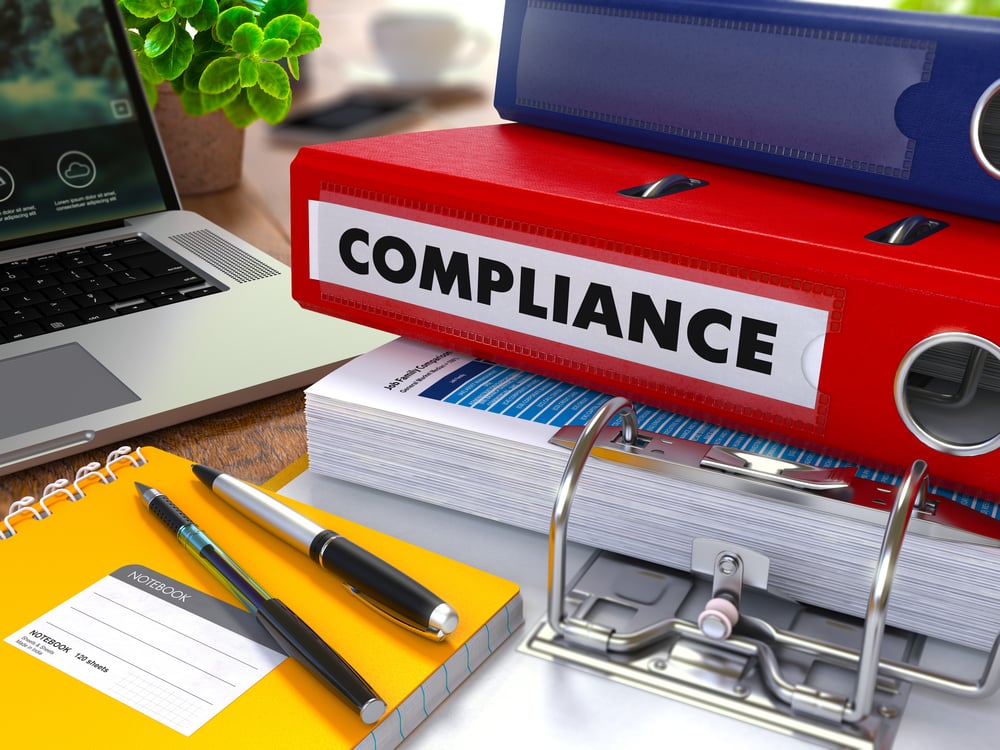What is Compliance Training in Healthcare?
What Does Compliance Mean in Business?
What is compliance?

Compliance refers to the process of adhering to guidelines or standards set by an authority. In business, compliance usually refers to following governmental regulations or internal company policies. Depending on the industry, different laws and regulations may apply. For example, companies in heavily regulated industries such as banking or healthcare must comply with more rules than companies in other industries.
Compliance can also refer to adhering to best practices or standards set by an organization, such as ISO 9000. Following these standards can help improve quality control and make an organization more efficient. Compliance is usually voluntary, but in some cases may be required by law.
Compliance is a broad term that can apply to many different aspects of business. Some common compliance areas include safety, security, ethics, and the environment. Below are some examples of compliance-related activities:
- Conducting safety audits
- Implementing security measures
- Creating an ethical code of conduct
- Following environmental regulations
Organizations typically have a compliance department or officer responsible for ensuring that the company adheres to all relevant laws and regulations. This can involve developing policies, conducting training, and performing audits. Having a strong compliance program in place can help prevent breaches of regulations, which can result in heavy fines or other penalties.
Compliance is an important part of running a business, but it can also be complex and time-consuming. To stay compliant, it’s important to keep up with any changes in the law or company policy. Organizations may also need to periodically review their compliance program to make sure it’s effective.

The benefits of compliance
There are many benefits to complying with regulations and policies. Perhaps the most obvious benefit is avoiding penalties for non-compliance, which can be costly. In addition, compliance can help businesses avoid legal troubles, build trust with customers and partners, and improve employee safety. Furthermore, adhering to standards can make businesses appear more professional and reliable.
There are many benefits to complying with regulations and policies. Perhaps the most obvious benefit is avoiding penalties for non-compliance, which can be costly. In addition, compliance can help businesses avoid legal troubles, build trust with customers and partners, and improve employee safety. Furthermore, adhering to standards can make businesses appear more professional and reliable.
Adhering to regulations can be costly for businesses, but the penalties for non-compliance can be much more expensive. In addition, compliance can help businesses avoid legal troubles, build trust with customers and partners, and improve employee safety. Furthermore, standards can make businesses appear more professional and reliable. By complying with regulations, businesses can avoid many potential problems and improve their operations.

The costs of non-compliance
There can be significant costs associated with non-compliance. Businesses may face fines or other penalties for breaking laws or regulations. In addition, they may damage their reputation if they are caught violating standards, which can lead to lost customers or business partners.
Furthermore, non-compliance can put employees at risk if safety standards are not being met. Finally, businesses may have to spend additional money to fix the problems that led to their non-compliance. All of these costs can have a negative impact on a company's bottom line. In some cases, the costs of non-compliance can be so high that they force businesses to close their doors for good.
How to create a successful corporate compliance program
There are a few key steps to creating a compliance program. First, businesses should identify which laws and regulations apply to them. Next, they should develop policies and procedures for complying with these standards. Finally, they should appoint someone to oversee the compliance program and ensure that it is being followed. By taking these steps, businesses can create a culture of compliance that will help them avoid penalties and legal troubles.
When it comes to compliance, businesses need to be proactive. They should identify the applicable laws and regulations, and then develop policies and procedures for complying with them. By taking these steps, businesses can create a culture of compliance that will help them avoid penalties and legal troubles.
One of the most important aspects of a compliance program is having someone responsible for overseeing it. This person should make sure that the program is being followed and that employees are aware of their obligations. Additionally, this person can help to resolve any issues that may arise.
Creating a compliance program can seem daunting, but it is essential for businesses to protect themselves from legal penalties and other problems. By taking the time to develop policies and procedures, and appointing someone to oversee the program, businesses can create a culture of compliance that will help them avoid penalties and legal troubles.
The six phases of compliance:
There are six key phases of compliance that businesses must go through to ensure they are compliant with all regulations.
These phases are:
1. Identification: The first step is to identify which regulations apply to your business. This can be done by conducting a risk assessment or by working with a legal or compliance consultant.
2. Evaluation: Once you know which regulations apply to your business, you need to evaluate your current compliance status. This will help you identify any gaps in your compliance program.
3. Planning: The next step is to develop a plan to close any compliance gaps. This plan should include timelines, milestones, and assigned responsibility for each task.
4. Implementation: The fourth phase is to implement the plan. This includes putting procedures and controls in place to ensure compliance with all relevant regulations.
5. Monitoring: Once the plan is implemented, you need to monitor compliance on an ongoing basis. This includes regular audits and reviews of your compliance program.
6. Reporting: The final phase is to report on your compliance status. This report should be made available to all relevant stakeholders, including regulators.
The six phases of compliance are: identification, evaluation, planning, implementation, monitoring, and reporting.
Businesses must go through all six phases to ensure they are compliant with regulations. Each phase is important in its own right and failure to comply with just one phase can lead to significant penalties.
Glossary of Key Terms:
Regulatory compliance:
Regulatory compliance is the process of adhering to laws and regulations.
Penalties: punishments for breaking laws or regulations, which can include fines, jail time, or other sanctions.
Corporate compliance:
Corporate compliance is the process of ensuring that a company adheres to its internal rules and regulations.
Ethical compliance:
Ethical compliance is the process of ensuring that a company's employees adhere to ethical standards.
Safety compliance:
Safety compliance is the process of ensuring that a company's employees follow safety rules and regulations.
Compliance requirements:
Compliance requirements are the laws and regulations that a company must follow.
Policies and procedures:
Policies and procedures are the guidelines that a company uses to ensure compliance with laws and regulations.
Compliance culture:
A compliance culture is an organizational culture in which employees are expected to comply with laws and regulations.
Compliance officer:
A compliance officer is a person who is responsible for overseeing a company's compliance program.
Compliance efforts:
Compliance efforts are the steps that a company takes to ensure compliance with laws and regulations
Non-compliance:
Non-compliance is the failure to adhere to laws and regulations. Penalties for non-compliance can include fines, jail time, or other sanctions.
Business operations:
Business operations are the activities that a company undertakes to generate revenue.
Compliance management software:
Compliance management software is a type of software that helps businesses manage their compliance programs. This type of software can automate many of the tasks associated with compliance, including policy creation, employee training, and record keeping. Additionally, the software can help businesses track their compliance progress and identify potential areas of improvement.

Compliance regulations:
Compliance regulations are the laws and regulations that businesses must follow in order to comply with the law.
Compliance tools:
Compliance tools are the resources that businesses use to help them comply with laws and regulations. These tools can include compliance management software, employee training materials, and policies and procedures.
Compliance audits:
Compliance audits are periodic reviews of a company's compliance program. These audits can be conducted internally by the company, or externally by regulators or other third parties. The purpose of a compliance audit is to identify any weaknesses in the program and make recommendations for improvements.
Compliance professionals:
Compliance professionals are individuals who specialize in helping businesses comply with laws and regulations. These professionals can provide advice on compliance issues, help develop compliance programs, and conduct compliance audits.
Internal policies:
Internal policies are the rules and regulations that a company sets for itself in order to comply with laws and regulations. These policies may be specific to compliance, or they may cover other areas of the business.
External policies:
External policies are the rules and regulations that a company must follow in order to comply with laws and regulations.
Chief compliance officer:
The chief compliance officer is the person responsible for overseeing a company's compliance program. This individual is typically a senior-level executive, and their duties may include developing compliance policies, conducting compliance audits, and training employees on compliance issues.
Compliance department:
The compliance department is the section of a company that is responsible for overseeing compliance with laws and regulations. This department may be responsible for developing compliance policies, conducting compliance audits, and training employees on compliance issues.
Compliance risk:
Compliance risk is the chance that a company will face penalties for failing to comply with laws and regulations. This risk can be mitigated by having a strong compliance program in place.
Penalties for non-compliance:
Penalties for non-compliance can include fines, jail time, or other sanctions.
Fines:
Fines are a type of penalty that can be imposed on a company for failing to comply with laws and regulations. The amount of the fine will vary depending on the severity of the offense.
Jail time:
Jail time is a type of penalty that can be imposed on an individual for failing to comply with laws and regulations. The length of the jail sentence will vary depending on the severity of the offense.
Health insurance portability:
Health insurance portability is the ability of individuals to maintain their health insurance coverage when they change jobs. This coverage is typically maintained through a group health insurance plan.
Securities and exchange commission:
The securities and exchange commission is a government agency that regulates the securities industry. The commission enforces securities laws and oversees the activities of broker-dealers, investment advisers, and other participants in the securities market.
Federal trade commission:
The federal trade commission is a government agency that promotes competition and protects consumers from unfair or deceptive practices. The commission enforces antitrust laws and regulates a variety of industries, including advertising, consumer protection, and competition.
Consumer financial protection bureau:
The consumer financial protection bureau is a government agency that protects consumers from unfair, deceptive, or abusive practices. The bureau regulates the offering of consumer financial products and services, including credit cards, mortgages, and student loans.
CLICK HERE to request a free (no commitment) online demo of your desired compliance training topics



